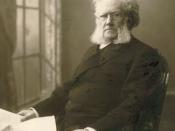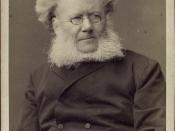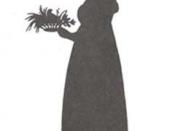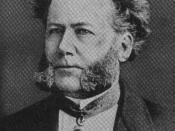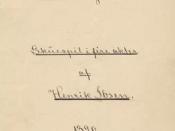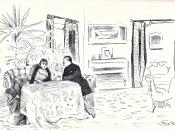I think Hedda is the forerunner of the quintessential film noir chic--simultaneously tough and weak, scheming, continuously dissatisfied, and bored with her own lot in life. She never really loves, but rather consumes. She needs attention and has a pathological fear of being rejection. She designs the entire plot that culminates in her old flame's suicide because it is something to do--a game--and one that revolves around her. Her own suicide galvanizes this idea--she notes her husband's growing affections for his level headed assistant and realizes (probably always has) that her impulsiveness is peavish. She is also suspect--the game has been foiled for her and she is getting old (no longer a woman worth chasing by Victorian standards). And so she pulls the trigger.
Gabler's "living through others" is classic: women have been taught traditionally to define themselves in terms of their (often subservient, "nurturing") relations to others, rather than in terms of individual achievement,independent of domestic connections, as men are.
If we identify a "strong" woman (Hedda Tesman) whose husband is an ineffectual, bumbling and clueless scholar (Jorgen Tesman), haven't we in fact found an example of "role reversal"? And while quite willful, she proves incapable of action on her own (until her suicide). She manipulates, then lives vicareously through others--which looks a lot to me like a take on conservative stereotypes, a quite UNreversed woman who can't gone amuck. She *fantasizes* male creative action, and identifies with it (though she can't even manage that--her fantasy is of herself mirrored in the glory of her hero, with ivy leaves in his hair--the perfect, worshipful female!) Yes, she denies her innate, feminine creative role, childbearing (how often are we reminded of this?!) Concerned Supreme Court nominees need only refer to the precedent set in the last scene of Henrik Ibsen's Hedda Gabbler, where Hedda admits, "I am in your power, Judge Brack. You have me at your beck and call, from this time forward." Then she shoots herself in the head. That's the archetypal nineteenth-century woman saying "yes" and meaning "you revolt me you pig." Emma at the beginning of the novel was someone who made active decisions about what she wanted. She saw herself as the master of her destiny. Her affair with Rudolphe was made after her decision to live out her fantasies and escape the ordinariness of her life and her marriage to Charles. Emma's active decisions though were based increasingly as the novel progresses on her fantasies. The lechery to which she falls victim is a product of the debilitating adventures her mind takes.
